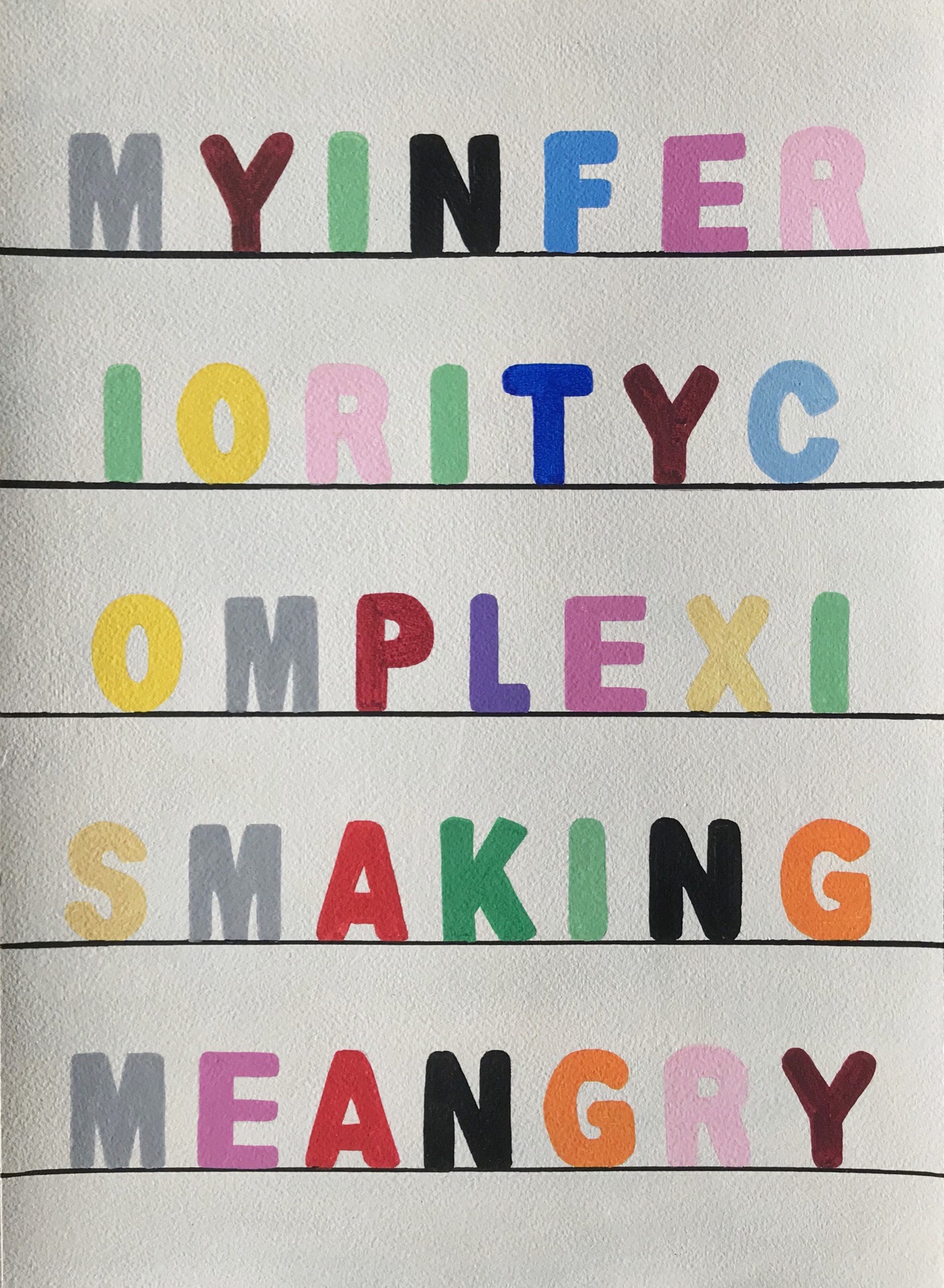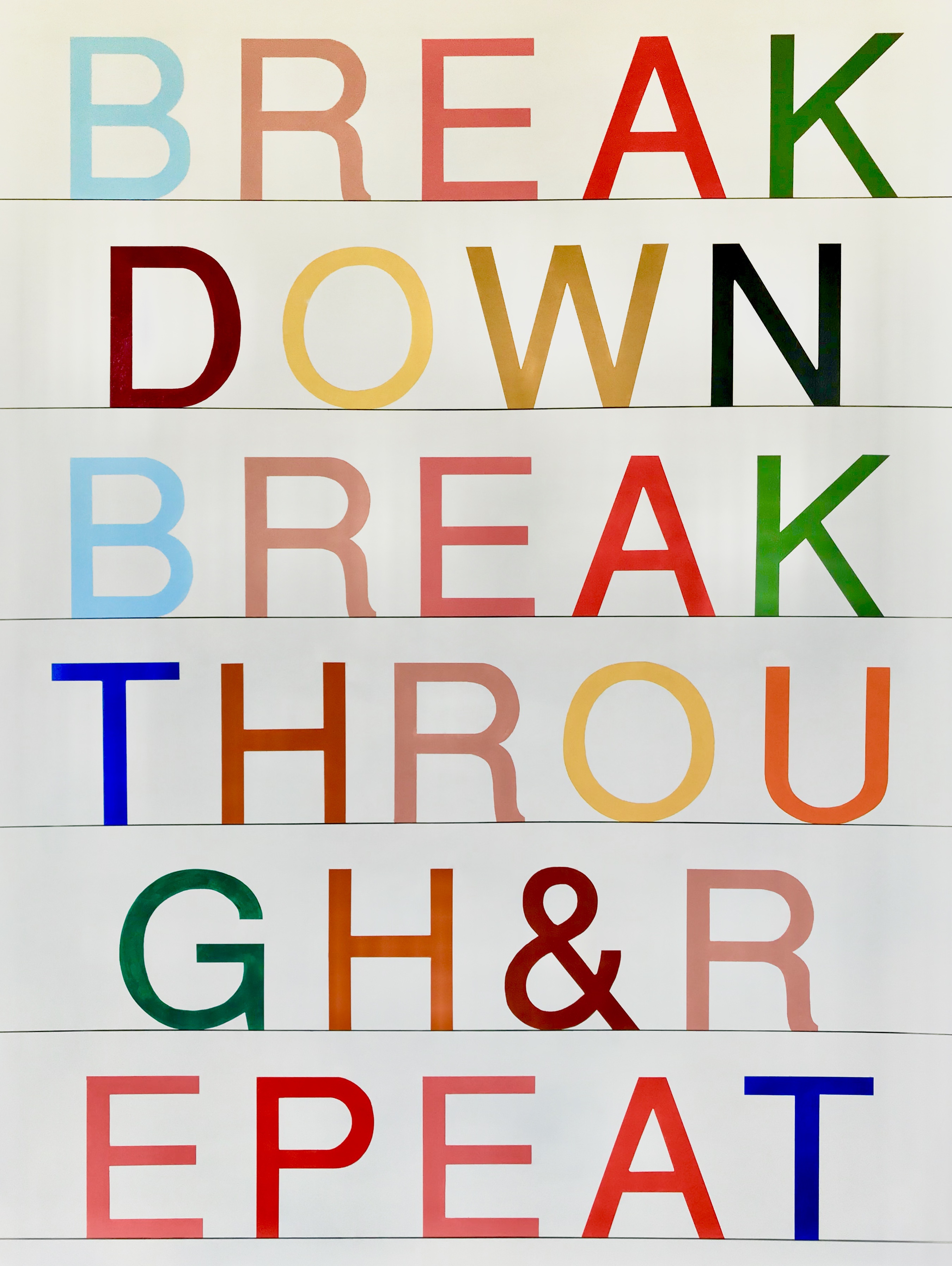Ces McCully is a contemporary artist originally from Melbourne. McCully’s text-based works rely on chance to create both intriguing and harmonious chromatic relationships. She draws on both autobiographical and societal elements, which are formative in their own way, resulting in minimalist abstract forms with both playful and empathic meanings.
We caught up with McCully (via email of course), who is currently showing work in Rhodes Contemporary's group show PAPER WORK (a selection of artworks on paper). Rhodes Editions are also currently working on an exiciting project with McCully with more details to be announced soon!
Hello Ces! Firstly, what was your motivation for moving to the South of France with your family?
It wasn’t something that sprang out of an overly logical place (none of my decisions really do), more a combination of restlessness, stress, wanting adventure and naivety about learning a language!
Has living in Albi influenced the style or content of the work you’re making?
It has and this is really due to how different my days are here. A few years ago when I was living back in Melbourne, life was busy and I was juggling a lot of things. I no longer feel the need to create a pure sense of calm for myself through art, which was what was happening before. I still need this on occasion, but now I’m in a place where I can play a lot more with colours and with ideas. Because I have so much dedicated time by myself here, I can also do a lot of deep thinking and reflection, which I find essential for the text work.

Photo: Instagram/@cesmccully
A few artists have said working in lockdown isn't that far removed from their usual studio life, but has the past few months taught you anything about yourself or made you look at your work and practise differently?
I agree that working doesn’t necessarily feel very different whether or not you’re in lockdown (although at times, being mindful of the availability of materials definitely has come into play). But the whole shared experience of the pandemic, the emotions that it’s brought up for myself and what I see from others, has driven me to produce text pieces that help me to process the world we’re now in or at times express my frustration.
Can you talk a bit more about your journey with art and the various mediums you’ve worked with, such as your experience as a textile artist?
It’s been long and complicated! I’ve always been a creative person, but I struggled for a long time to figure out what to focus on, pulled in many directions. I’ve realised over time that it was difficult for me because I’m fairly evenly ‘left’ and ‘right-brained’, if that’s still a term used. So now I know that it’s important for me to use both the creative and analytical sides of myself in what I do, and it’s what brings me a lot of satisfaction with my text pieces.
I studied contemporary art at university, and although I dabbled in painting I chose photography and digital imaging as my major. I think the immediacy of it appealed to me, as I’m an impatient person… In my time there I also became drawn to the psychology behind marketing, and picked up subjects in this area. After university, I worked in a lot of creative places where I got to combine these areas – and then I fell into copywriting too. It’s funny how things have come together over time, and how all of these passions and experiences have culminated in the artworks I create now.
Discovering textiles was an important time for me, as it helped me find my way back to pure creating. I was drawn to weaving initially to help with anxiety issues as there’s something very calming and comforting about using these materials, but I soon realised it was just a jumping off point and that I was finally ready to take the leap and focus on my own art practice.
What made you turn to paint and why this medium?
I turned to paint because I couldn’t achieve what I wanted to fast enough with textiles... As I said, I’m an impatient person!

When creating a work, is the practical process as measured and controlled as the aesthetic?
Actually, I use the element of chance in my work – so I never know how it’s going to look until the end! I find that a thrill. I assign a colour code to each letter of the alphabet and strictly stick to it, not matter how bothered I feel at times about the repetition of a colour or the lack of another. I love to see how the unplanned relationships of colour play out in a piece. Of course I did spend a lot of time in the beginning figuring out the schema, to ensure that there would still be a harmonious effect regardless of the combinations that come up.
The minimalism and satisfying effect of harmony and cohesion within your work is very appealing, is this a style that you always naturally progress to? Does this style echo your personality – are you quite a calm and organised person?
Yes and no. I’m a contradiction at times… Throughout my life, I’ve had people comment on the calming effect I have on them. I find this quite funny because I’m often having a panic attack or an existential crisis on the inside. And I wouldn’t say in general that I’m an organised person. I don’t like to plan long-term, and I don’t remember appointments or birthdays; but if I have a little project that I’m passionate about, I will organise it to within an inch of its life. And I do like a neat studio.
I’ve always been very sensitive to my surroundings, and if what I’m looking at seems chaotic, I feel irritated and off-kilter. I prefer not to be, and so I imagine creating harmony for myself and those viewing a piece will always be an important element of my art.
You’ve said that you get a kick out of the problem-solving process when making your artwork, like completing a jigsaw puzzle. Do you always ‘complete the puzzle’ and is this a sign of the painting’s success?
Very much so! Creating harmony while maintaining vitality in a piece is what I strive for. I think creating something harmonious is fairly straightforward, the challenging part of the problem-solving process for me is maintaining this harmony while creating a sense of playfulness in a piece to bring it to life and to keep the eyes dancing around the canvas.

Many of your collectors will know you for painting on large canvases; how have you found making smaller works on paper?
It’s an enjoyable shift actually. I love the impact that a large work naturally has and the movement it requires of me, but I’ve also learned to love the finer work that paper requires. There’s a shift in the mood it requires, and I’ve found it perfect to be able to paint by the fire over these colder months.
Your text work is always so bang-on and reassuring at the same time, you seem to be able to voice a universal consciousness. What’s the process there, does the text just come to you?
Well firstly, thanks! That’s lovely to hear. I guess the text pieces are a result of being in my head so much, always thinking about human nature and my own life, and the state of the things in the world. I’ll often use something I overhear someone say to springboard from for ideas, and my interest in psychology means I come across research occasionally that provides interesting insights into human behaviour. I’m also an empathetic person naturally and always thinking about the motivations behind people’s actions and words. I might come up with the text I want to use immediately or jot down the idea to refine at a later time.
I remember a moment a few years ago that set me on this path. I was reading a study done on college professors, and the researchers found that every professor believed that they were more intelligent than their colleagues. I found it hilarious, and I started looking at people in a different way. It’s like I suddenly realised that my secret ‘undesirable’ thoughts were probably the same as everyone else’s. That seems obvious now, but it was honestly a revelation. I had to test that theory when I started the text pieces, and it took a lot more courage than usual to put the work out there.
Sometimes I want to highlight truths that are common but not spoken of, often things I find a little humorous. Sometimes it’s simply cathartic for me to put it out into the world. And sometimes it’s just something that I think people need to hear.

The ‘Help I’m Bored Again’ work and many of your text works seem to resonate with the kind of year we were having in 2020 (and 2021), what was the concept behind this work?
For me this piece operates on many levels. It speaks to the lockdown experience (particularly for the struggling extroverts), but also to the restlessness of feeling your life or relationship is stagnating, or to those of us who struggle to be alone and need someone to rescue us from our own thoughts, or to our shortening attention spans due to technology and the fact that most of us can’t be bored for more than a minute anymore without pulling out our phone.
Sometimes I want to highlight truths that are common but not spoken of..."
Your True Selves Project sounds really fascinating and reminded me of PostSecret. What was the inspiration for this project and what are you hoping to create or is the project the art in itself?
Well it really came about for selfish reasons… I wanted insights into people’s minds to tap into for my art. I quickly realised how cathartic it was for those submitting, and decided that by sharing these, maybe I could help people feel less alone with their thoughts and give a little dose of reality and empathy to the world of social media. I’m hoping to keep growing the number of submissions and in time use them in physical installations also.
You seem to have exhibited all over! Have you visited London and do you have any memories here?
Yes, I love London! I came to visit a friend 9 years ago and fell in love with the flower markets and the shops on the canal boats. I’ve visited many times since and I’m absolutely busting to come back when I can. I love living here in the French countryside, but sometimes I really miss a good pub – and speaking and understanding people easily! My French is truly awful and it’s taking so much longer than I thought to learn it. London gives us a fix of that home feeling, as I feel like Melbourne is a miniature London in many ways.
What would you like to do next?
Above all right now, to see my family and friends again! I’m crossing fingers the borders will open again some time this year. But in terms of art, one medium that I’d love to spend time exploring is sculpture. I have so many ideas that I’d love to bring to life. At the moment I’m focused on painting for shows scheduled for this year, but then maybe I’ll carve out some time to start experimenting with this.

The PAPER WORK exhibition will run virtually from 14th January - 27th February 2021.
(To view the works available in the show please email us.)
For all enquiries, please contact info@rhodescontemporaryart.com
Follow Ces McCully on INSTAGRAM

